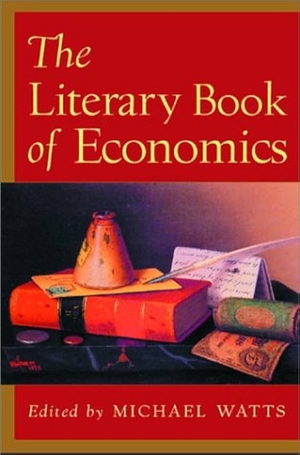"Ahem!" said the Mouse with an important air, "are you all ready? This is the driest thing I know. Silence all round, if you please! 'William the Conqueror, whose cause was favoured by the pope, was soon submitted to by the English, who wanted leaders, and had been of late much accustomed to usurpation and conquest. Edwin and Morcar, the earls of Mercia and Northumbria—' "
"Ugh!" said the Lory, with a shiver.
—Lewis Carroll, Alice in Wonderland
If Lewis Carroll were writing today, he would have the Mouse recite "the driest thing I know" not from an old history book, but from something by a contemporary economist. Something like — oh, like Alan Greenspan's testimony before Congress last month:
"Some of the residual war-related uncertainties have abated further and financial conditions have turned decidedly more accommodative, supported, in part, by the Federal Reserve's commitment to foster sustainable growth and to guard against a substantial further disinflation. Yields across maturities and risk classes have posted marked declines, which together with improved profits boosted stock prices and household wealth. If the past is any guide, these domestic financial developments, apart from the heavy dose of fiscal stimulus now in train, should bolster economic activity over coming quarters."
To quote the Lory: "Ugh." What a depressing abuse of the English tongue. And if that's how Greenspan expresses himself when he knows a large and influential audience is hanging on his every word, what must he sound like when he speaks or writes on lesser occasions?

There is no excuse for economic prose to be so dull and sluggish. It shouldn't be any harder to write absorbingly about economics than to write about culture, science, or sports. As a discipline for understanding and describing the human condition, economics is at least the equal of the others. But a reader looking for feeling and eloquence doesn't typically find them in the financial pages of the newspaper or on the "Economics" shelf at the library. Of course, there are lively and compelling exceptions, but all in all, economic writing is the driest thing I know.
What prompts these thoughts is a new volume on economics from ISI Books. Edited by Michael Watts, The Literary Book of Economics covers a host of economic concepts: supply and demand, markets, property rights, entrepreneurship, elasticity, and more. But this is no brain-numbing soporific. How could it be when it contains the work of such immortals as Mark Twain, William Shakespeare and George Orwell?
Watts, a Purdue economist, had the ingenious notion of representing economic principles with selections drawn from literature, poetry, and drama. The result is a wonderfully rich and vivid survey of the economic realm — a compilation far more likely to kindle an interest in economics than Greenspan's jargon-filled sludge.
For Watts, Robert Frost's The Road Not Taken illustrates the idea of opportunity cost — the options forgone every time a choice is made. Six epitaphs from Edgar Lee Masters's Spoon River Anthology help illuminate specialization and the division of labor — key elements of industrial productivity. A Modest Proposal, Jonathan Swift's satirical recommendation that Irish children be eaten, is a perfect — and grisly — example of cost-benefit analysis.
Or consider Washington Irving's Poor-Devil Author, the comic tale of a village poet convinced he has written a masterpiece for the ages. He heads off to London to sell his magnum opus and loftily invites a leading publisher to buy it for a thousand guineas. When the publisher declines to even read it, the offended poet (who narrates the story) storms from his office in a huff.
"When I turned the corner, my crest fell," the poet relates. "I cooled down in my pride and my expectations, and reduced my terms with the next bookseller to whom I applied. I had no better success, nor with a third, nor with a fourth. I then desired the booksellers to make an offer themselves; but the deuce an offer would they make. They told me . . . everybody wrote poetry; the market was overstocked with it."
Determined to see his poem in print, he publishes it himself at great expense — and loses his shirt. In the end, the poet gives up his dream of literary fame and turns instead "to writing for mere bread, and have ever since had a very tolerable life of it."
Irving's tale is about the deflating of youthful ambitions. Its message is that dreams of grandeur usually give way to the grit of real life. But it is also a memorable lesson in market economics — in the power of prices to convey information and the inexorable effect of supply and demand.
The stuff of economics, no less than that of literature and poetry, is human behavior and motivations. It is a vital point, and The Literary Book of Economics reinforces it admirably. Someone should send Alan Greenspan a copy.
(Jeff Jacoby is a columnist for The Boston Globe).
-- ## --
Follow Jeff Jacoby on Twitter.
Discuss his columns on Facebook.
Want to read more? Sign up for "Arguable," Jeff Jacoby's free weekly email newsletter
Want to read more Jeff Jacoby? Sign up for "Arguable," his free weekly email newsletter.

